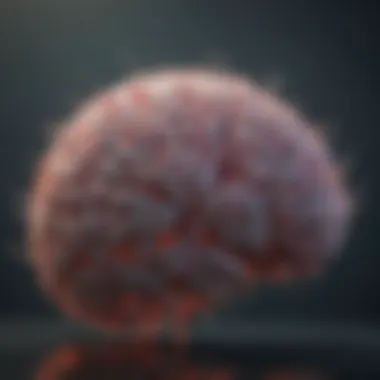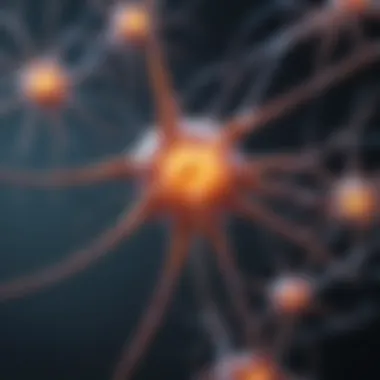The Influence of Pleasure Hormone on Overall Well-being Unveiled


Research Overview
As we embark on exploring the complex interplay between the pleasure hormone and well-being, it is essential to lay a solid foundation by understanding the scientific underpinnings of this relationship. This section will delve into the intricate mechanisms through which the pleasure hormone influences both mental and physical health, providing a comprehensive overview of the key concepts to be discussed in this enlightening journey.
Health Implications
The discussion on the impact of the pleasure hormone on health is paramount in elucidating the implications of our research findings. By critically analyzing the effects of this crucial hormone on overall well-being, we will unearth the potential benefits and risks associated with its fluctuations. Additionally, we will explore practical examples of how this newfound knowledge can be integrated into daily routines, enhancing not only health but also quality of life.
Well-being Strategies
In uncovering the profound influence of the pleasure hormone on well-being, it becomes imperative to translate these research insights into actionable strategies for improving health outcomes. This section will provide readers with practical tips and evidence-based approaches derived from the research, offering guidance on implementing positive changes to enhance overall well-being. Furthermore, personal anecdotes and case studies will underscore the efficacy of these strategies, illuminating the transformative power of incorporating science-backed practices into daily life.
Expert Insights
Delving into the realms of expert analyses, this section will offer a comprehensive evaluation of the research findings through the lens of seasoned professionals. By synthesizing expert opinions on the implications of pleasure hormone on well-being, readers will gain a nuanced understanding of the subject matter. Additionally, a curated Q&A session with a relevant expert will further enhance the depth of insight, providing valuable perspectives and clarifications on the research's significance.
Introduction to Pleasure Hormone
In the realm of well-being and human physiology, the role of pleasure hormones stands as a pivotal element. Understanding the intricacies of these hormones is not merely a matter of curiosity but a key factor in deciphering the complex mechanisms that govern our mental and physical health. Delving into the labyrinth of pleasure hormones offers profound insights into how our bodies and minds respond to various stimuli, ultimately shaping our overall wellness.
Defining Pleasure Hormone
Biological origins of pleasure hormone
The biological underpinnings of pleasure hormone unveil a fascinating narrative of molecular interactions within the human body. These hormones, originating from specialized glands and neural pathways, orchestrate a symphony of responses that range from euphoria to contentment. Exploring the genesis of pleasure hormones sheds light on their evolutionary significance and adaptive functions that have persisted through millennia. The intricate dance of neurotransmitters and receptors underscores the sophisticated nature of these hormones, underscoring their crucial role in our well-being.
Functionality in the human body
The functionality of pleasure hormones within the human body is akin to a finely tuned mechanism that influences a myriad of physiological and psychological processes. From regulating mood to modulating pain perception, these hormones navigate a complex network of cellular signaling to maintain homeostasis. Understanding how pleasure hormones operate in tandem with other biological systems offers a profound glimpse into the interconnectedness of our bodily functions. While the benefits of these hormones are vast, their dysregulation can lead to a cascade of detrimental effects, underscoring the delicate balance required for optimal well-being.
Neurotransmitters Involved
Dopamine: The primary player
Dopamine, heralded as the primary player in the realm of pleasure hormones, is a neurotransmitter that exerts a profound influence on reward processing and motivation. Its role in reinforcing adaptive behaviors and mediating pleasure responses highlights its significance in cognitive functioning. The intricate mechanisms through which dopamine cascades through neural circuits underscore its versatility in shaping both our actions and emotions. While dopamine is essential for our well-being, imbalances in its levels can have far-reaching consequences, emphasizing the need for a nuanced understanding of this neurotransmitter.
Endorphins: The natural painkiller


Endorphins, often referred to as the body's natural painkillers, offer a unique perspective on the interplay between pleasure and physiological resilience. These endogenous opioids not only alleviate pain but also induce feelings of euphoria and well-being, showcasing the multifaceted nature of pleasure hormones. Their ability to modulate pain perception and enhance resilience underscores their role as essential contributors to our overall health. However, a thorough understanding of endorphins is imperative to harness their benefits effectively and mitigate potential drawbacks.
Serotonin: The mood regulator
Serotonin, known for its role as a mood regulator, weaves a delicate tapestry of emotional stability within the human psyche. This neurotransmitter, predominantly found in the gastrointestinal tract and central nervous system, modulates a wide array of functions ranging from mood regulation to appetite control. The nuanced interplay between serotonin levels and mental well-being underscores its significance in fostering emotional balance. While serotonin's impact on mental health is profound, disruptions in its levels can manifest in a spectrum of mood disorders, necessitating a comprehensive approach to maintaining optimal serotonin equilibrium.
The Science Behind Pleasure Hormone
In this section of our detailed exploration of the pleasure hormone and its impact on well-being, we delve into the intricate workings of the scientific aspects involved. Understanding the system responsible for generating feelings of pleasure and satisfaction is crucial. By shedding light on the underlying processes, we gain insight into how these mechanisms influence our overall health and happiness. This elucidation serves as a solid foundation for comprehending the significance of pleasure hormones in our well-being.
Neurological Pathways of Pleasure Hormone
Reward System in the Brain
Diving into the reward system in the brain allows us to unravel the neural circuitry responsible for processing stimuli related to pleasure and reward. This intricate network, primarily involving regions like the nucleus accumbens and the ventral tegmental area, plays a pivotal role in shaping our behaviors and emotional responses. Understanding the functionality of this system offers a glimpse into how our brain perceives and processes pleasurable experiences. Unveiling the intricacies of the reward system helps us grasp why certain activities or substances trigger feelings of pleasure, elucidating their importance in regulating our well-being.
Impact on Behavior and Emotions
Exploring how pleasure hormones impact behavior and emotions provides a deeper understanding of the connection between our neural chemistry and psychological states. Dopamine, for instance, is closely linked to motivation and reward-seeking behaviors, influencing how we perceive and engage with pleasurable stimuli. Serotonin, on the other hand, contributes to mood regulation, affecting our emotional stability and well-being. By dissecting the impact of pleasure hormones on our behavior and emotions, we can appreciate the intricate interplay between brain chemicals and psychological states. Recognizing these effects sheds light on the profound influence of pleasure hormones on shaping our mental and emotional well-being.
Role in Reward Circuitry
In this segment, we explore the pivotal role of pleasure hormones in the brain's reward circuitry. The interaction between pleasure centers and neurotransmitters such as dopamine and endorphins plays a crucial part in reinforcing certain behaviors and emotions. By delving into how these neural pathways modulate our responses to rewarding stimuli, we unlock insights into the motivational aspects of pleasure hormones. Understanding how these chemicals drive our actions and reinforce certain patterns of behavior is essential for recognizing their impact on well-being.
Motivational Aspects
Unpacking the motivational aspects of pleasure hormones reveals how these biochemical signals influence our drive, goal-setting behavior, and overall motivation. Dopamine, often termed the 'reward molecule,' fuels our desire for achieving goals and experiencing pleasure. Endorphins, with their pain-relieving properties, not only dampen discomfort but also contribute to a sense of well-being and accomplishment. By examining the motivational aspects of pleasure hormones, we gain a deeper appreciation for how these neurotransmitters drive our actions and shape our well-being.
Effects of Pleasure Hormone on Mental Health
Exploring the intricate relationship between pleasure hormones and mental health is crucial in understanding the complexities of human well-being. The effects of pleasure hormones on mental health delve deep into the physiological and psychological aspects that play a pivotal role in shaping our emotional and cognitive experiences. Understanding how these hormones impact mood, stress levels, and overall mental well-being is essential for optimizing health outcomes and achieving a balanced life.
Mood Regulation
Impact on happiness levels
Unraveling the impact of pleasure hormones on happiness levels uncovers the underlying mechanisms that contribute to our emotional states. By influencing neurotransmitter activity in the brain, these hormones play a significant role in modulating feelings of contentment and joy. The stimulation of pleasure centers in the brain triggers the release of dopamine, leading to sensations of pleasure and reward. This neurotransmitter not only enhances mood but also strengthens neural pathways associated with positive emotions. The regulation of happiness levels by pleasure hormones is a critical factor in promoting overall well-being and mental resilience.


Potential implications for mood disorders
Delving into the potential implications of pleasure hormones for mood disorders unveils new possibilities for therapeutic interventions. Imbalances in these hormones can significantly impact mood regulation, potentially leading to conditions such as depression and anxiety. Understanding how pleasure hormones modulate mood disorders offers valuable insights into developing targeted treatments that restore equilibrium to neurotransmitter systems. By addressing the underlying hormonal imbalances associated with mood disorders, researchers and clinicians can revolutionize mental health care, offering personalized interventions that cater to individual needs.
Stress and Anxiety Management
Cortisol modulation
Examining the role of pleasure hormones in cortisol modulation sheds light on how these biochemical processes influence stress responses in the body. Cortisol, known as the stress hormone, plays a vital role in regulating the body's physiological reactions to stressors. Pleasure hormones can interact with cortisol levels, potentially mitigating the harmful effects of chronic stress on mental health. By modulating cortisol secretion, pleasure hormones contribute to a balanced stress response, enhancing resilience and adaptive coping mechanisms.
Anxiolytic effects
Unveiling the anxiolytic effects of pleasure hormones illuminates their potential as natural anxiety regulators. These hormones can act as neurotransmitters that aid in calming the nervous system and reducing feelings of anxiety. By promoting relaxation and tranquility, pleasure hormones offer a holistic approach to managing anxiety symptoms. The anxiolytic effects of pleasure hormones provide an alternative avenue for individuals seeking natural remedies for anxiety, highlighting the significance of biochemical processes in mental well-being.
Physical Health Implications of Pleasure Hormone
Delving into the realm of physical health implications of pleasure hormone is crucial in understanding its multifaceted impact on overall well-being. This section sheds light on how the pleasure hormone, through its intricate mechanisms, influences various aspects of physical health, from pain relief to immune system modulation. By exploring these facets, we unravel the holistic significance of this hormone in promoting a healthy body and mind.
Pain Relief Mechanisms
Exploring the pain relief mechanisms associated with pleasure hormone unveils intriguing insights into its role in managing physical discomfort and enhancing well-being. This subsection delves into two key aspects: endorphins and natural analgesic properties.
Endorphins and Pain Perception
Endorphins play a pivotal role in regulating pain perception, acting as natural analgesics within the body. By examining how endorphins interact with the nervous system to alleviate pain, we gain a deeper understanding of their importance in pain management. Their ability to modulate pain signals and induce feelings of euphoria highlights their beneficial effects on overall well-being.
Natural Analgesic Properties
The natural analgesic properties associated with pleasure hormone offer a unique perspective on pain management strategies. By exploring the innate ability of the body to produce analgesic responses, we uncover the natural mechanisms that contribute to pain alleviation. Understanding the advantages of natural analgesics provides valuable insights into alternative pain relief methods that focus on harnessing the body's intrinsic mechanisms for promoting well-being.
Immune System Modulation
Investigating the impact of pleasure hormone on immune system modulation reveals dynamic interactions that influence the body's defense mechanisms and overall health. This subsection delves into two critical aspects: effects on immune response and inflammation regulation.
Effects on Immune Response
The effects of pleasure hormone on immune responses showcase its role in maintaining immune homeostasis and defending against pathogens. By elucidating how the hormone boosts immune function and enhances resilience, we uncover its benefits in promoting overall well-being. The intricate connection between pleasure hormone and immune response underscores the importance of a balanced hormonal environment in supporting immune health.


Inflammation Regulation
Understanding the role of pleasure hormone in inflammation regulation offers a comprehensive view of its anti-inflammatory properties and their impact on well-being. By exploring how the hormone helps regulate inflammatory processes in the body, we recognize its potential in mitigating inflammatory disorders and promoting overall health. The unique features of pleasure hormone in inflammation regulation shed light on its therapeutic potential in managing inflammatory conditions and optimizing immune function.
Strategies to Boost Pleasure Hormone Levels
In the realm of enhancing well-being, optimizing pleasure hormone levels plays a pivotal role. Strategies to boost pleasure hormone levels serve as a cornerstone in maintaining mental and physical health equilibrium. By delving into healthy lifestyle practices, individuals can harness the power of their own biology to elevate mood, regulate stress, and enhance overall quality of life. The significance of these strategies lies in their potential to fine-tune the delicate balance of neurotransmitters within the brain, consequently influencing various aspects of well-being.
Healthy Lifestyle Practices
Exercise Routines
Embarking on a journey of regular exercise routines unfolds a plethora of benefits towards augmenting pleasure hormone levels. The active engagement of the body in physical activity triggers the release of endorphins, the natural mood elevators. Exercise, with its inherent ability to stimulate the production of dopamine, facilitates a sense of accomplishment and well-being. The consistent nature of exercise routines in bolstering pleasure hormone levels makes it a sustainable and effective approach for enhancing overall health. While the commitment and dedication required for maintaining exercise regimens may pose as challenges, the tangible rewards of improved mood, vitality, and cognitive function outweigh any temporary discomfort or exertion.
Dietary Considerations
Navigating the landscape of dietary considerations proves to be a vital component in optimizing pleasure hormone levels. The foods we consume directly impact the biochemical processes within our bodies, influencing the production and regulation of neurotransmitters like serotonin and dopamine. By incorporating a nutrient-dense diet rich in essential vitamins, minerals, and amino acids, individuals can provide the necessary building blocks for neurotransmitter synthesis. The strategic selection of foods that support brain health and neurotransmitter function can significantly enhance the effects of pleasure hormones on overall well-being. While the temptation of indulging in processed foods laden with sugars and artificial additives may be present, the long-term benefits of a balanced and wholesome diet are instrumental in promoting sustained happiness and mental clarity.
Mindfulness and Meditation Techniques
Amidst the fast-paced rhythm of modern life, integrating mindfulness and meditation techniques stands as a beacon of serenity and self-care. Stress-relief methods, such as meditation and deep breathing exercises, offer sanctuary from the chaos of daily stressors, promoting a state of calm and tranquility conducive to pleasure hormone balance. By fostering a mind-body connection through mindfulness practices, individuals can cultivate a heightened sense of self-awareness and emotional resilience. The therapeutic effects of mindfulness techniques extend beyond mere relaxation, permeating into the realm of holistic well-being by harmonizing brain chemistry and facilitating optimal neurotransmitter function. Engaging in mindfulness practices may require patience and dedication, yet the profound benefits of enhanced mood stability, stress resilience, and cognitive clarity make these techniques indispensable tools in the pursuit of elevated well-being.
Conclusion
Key Takeaways
Integral role of pleasure hormone in well-being
Scrutinizing the integral role of pleasure hormone in well-being, we delve into its specific aspects and elucidate its paramount significance. By emphasizing the profound impact this hormone has on our overall well-being, we underline its essential contribution to our health and happiness. The key characteristic of pleasure hormone lies in its ability to regulate mood, boost happiness levels, and potentially alleviate mood disorders. This distinctive feature renders pleasure hormone a crucial element in optimizing our well-being, offering a natural and effective means to enhance mental health. Understanding the advantages of pleasure hormone in promoting well-being equips us with insights into leveraging its benefits for a healthier and more fulfilling life.
Impact on mental and physical health
Exploring the impact of pleasure hormone on mental and physical health, we uncover its profound implications for our overall well-being. By highlighting how pleasure hormone influences both our mental and physical health, we elucidate its integral role in maintaining a balanced and healthy lifestyle. The key characteristic of this influence lies in its ability to modulate stress, manage anxiety, alleviate pain, and regulate immune responses. By embracing these benefits, individuals can harness the power of pleasure hormone to enhance their mental resilience and physical well-being, fostering a harmonious connection between mind and body.
Future Implications
Research avenues
Delving into the realm of research avenues, we navigate through the specific aspects that contribute to advancing our understanding of pleasure hormone and its effects on well-being. By shedding light on emerging research directions, we aim to bolster the foundation of knowledge surrounding pleasure hormone, paving the way for future breakthroughs in the field of mental and physical health. The key characteristic of these research avenues lies in their potential to unravel new insights, mechanisms, and therapeutic targets related to pleasure hormone. Embracing these avenues opens up a world of possibilities for enhancing our well-being through innovative research and evidence-based practices.
Therapeutic applications
Exploring the realm of therapeutic applications, we delve into how pleasure hormone can be harnessed for improving well-being and health outcomes. By elucidating the key characteristics of therapeutic applications related to pleasure hormone, we showcase the transformative potential of this hormone in clinical settings. The notable advantage of these applications lies in their ability to offer natural and holistic approaches to managing mental health conditions, alleviating physical discomfort, and supporting overall wellness. By embracing these therapeutic applications, individuals can tap into the profound benefits of pleasure hormone for enhancing their quality of life and optimizing their health.



